Is Marijuana Legal in Vermont?
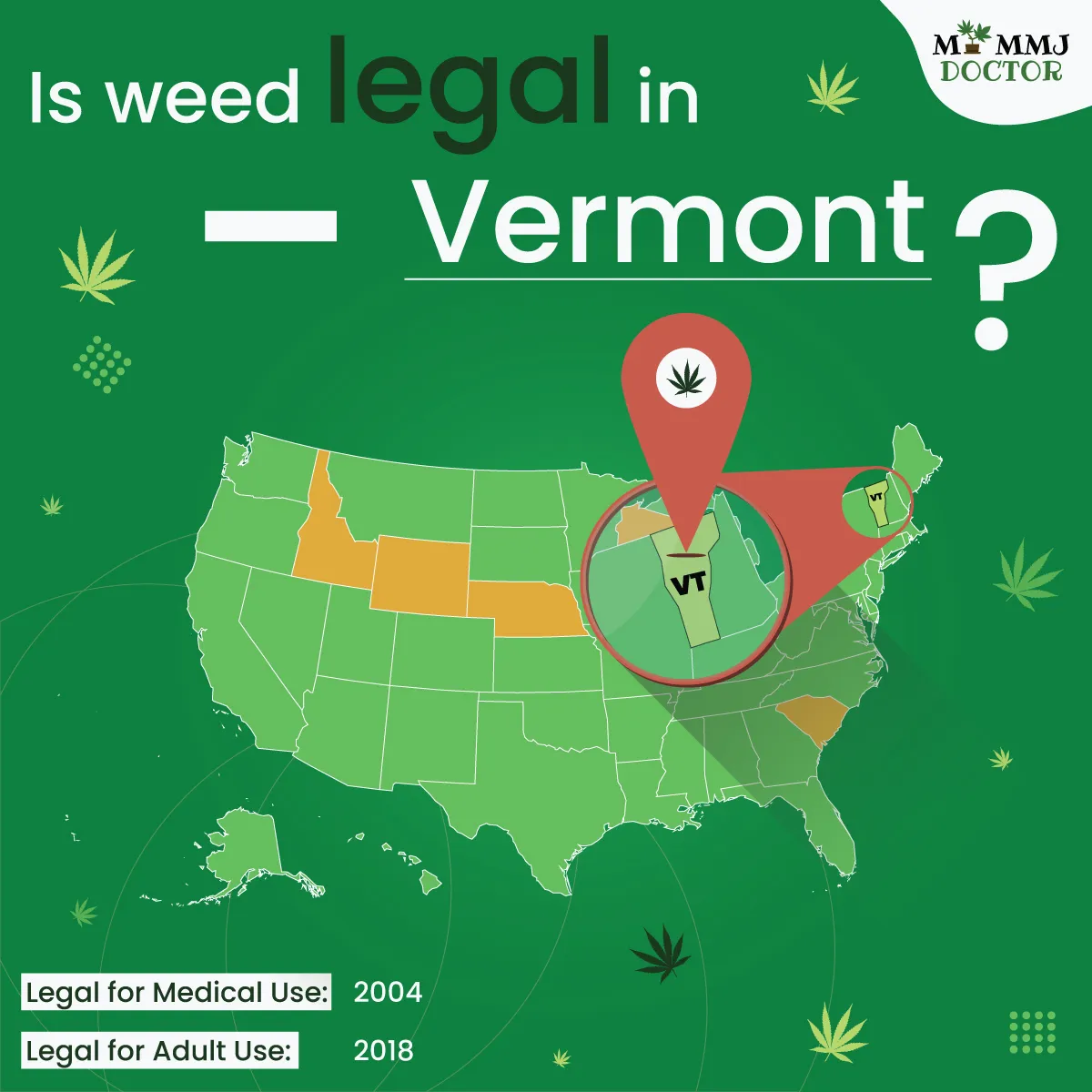
Marijuana is legal in Vermont for both medical and recreational use, with a history of legalization dating back to 2004 for medical cannabis and 2018 for recreational use. Adults aged 21 and older can purchase up to 1 ounce of cannabis at over 50 licensed dispensaries, provided they present a valid government-issued photo ID. Cannabis is available in various forms, including flowers, concentrates, edibles, and vape cartridges, all subject to quantity limits and THC potency restrictions. While recreational cannabis delivery is not permitted, adults can cultivate up to two mature and four immature plants at home, with medical users allowed to grow more under specific conditions. Despite legalization, Vermont enforces strict rules against public cannabis use, federal property consumption, and transporting cannabis across state lines.
What are the Vermont Weed Laws?
- Prohibition (1915)
Vermont banned cannabis in 1915 as part of a nationwide trend of restrictions. - Medical Use (2004)
In May 2004, Vermont legalized medical cannabis when Governor James Douglas allowed Senate Bill 76 to pass without signing it. The law expanded in 2007 with Senate Bill 7. - Decriminalization (2013)
In June 2013, Governor Peter Shumlin signed HB200, decriminalizing possession of up to one ounce of cannabis, making it a civil infraction.
Legalization Timeline:
- 2014:
Governor Shumlin supported a regulated cannabis system. A study suggested Vermont could earn up to $75 million annually in taxes but highlighted risks from federal interference and competition from neighboring states. - 2017-2018:
The Vermont legislature passed a law allowing the possession of one ounce of cannabis and the cultivation of two plants. Governor Phil Scott allowed it to become law without signing. The law took effect on July 1, 2018. - Regulated Sales (2020-2022):
In October 2020, Vermont approved a tax-and-regulate system. Licensed medical dispensaries began selling to adults in May 2022, with retail sales starting in October 2022.
Patient Possession Limits
- Usable Marijuana: A patient is permitted to possess up to two ounces of usable marijuana.
- Single Servings: Medical cannabis products can have no more than 100 mg of THC per single serving.
Home Cultivation:
- Patients are allowed to cultivate up to 12 marijuana plants at home. However, no more than six of these plants can mature at any given time.
- Patients are explicitly allowed to possess the total harvest from their plants.
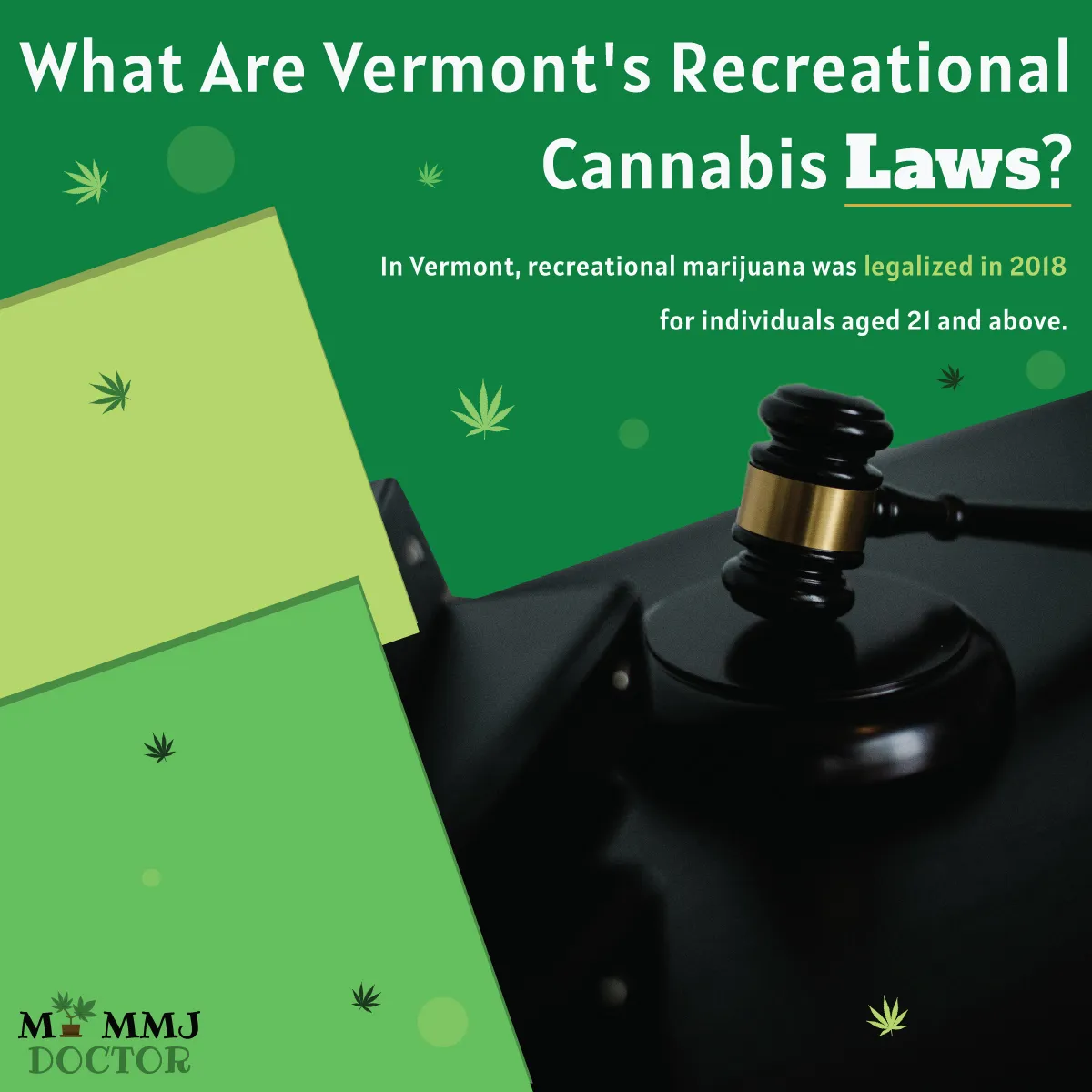
Recreational Marijuana Laws in Vermont
Key Restrictions:
- Hemp-Derived Cannabinoids: Vermont prohibits the sale and use of some cannabinoids like delta-8.
- Possession Limits:
- Over 1 ounce or 5 grams of hashish results in penalties.
- For 1-2 ounces, fines range from $100 (first offense) to $200 (second offense).
- Possessing over 10 pounds can lead to 15 years in prison and a $500,000 fine.
- Cultivation: Growing more than two mature or four immature plants is prohibited.
- Public Use: Consuming cannabis in public is illegal.
Qualifying Condition for Vermont Medical Marijuana Card:
To qualify for a medical marijuana card in Vermont, patients must have one or more of the following conditions:
- Cancer
- Multiple Sclerosis
- HIV or AIDS
- Glaucoma
- Crohn’s disease
- Parkinson’s disease
- PTSD (Post-Traumatic Stress Disorder)
Patients with debilitating symptoms, such as:
- Cachexia (wasting syndrome)
- Chronic pain
- Severe nausea
- Seizures
Does Vermont Add New Qualifying Conditions?
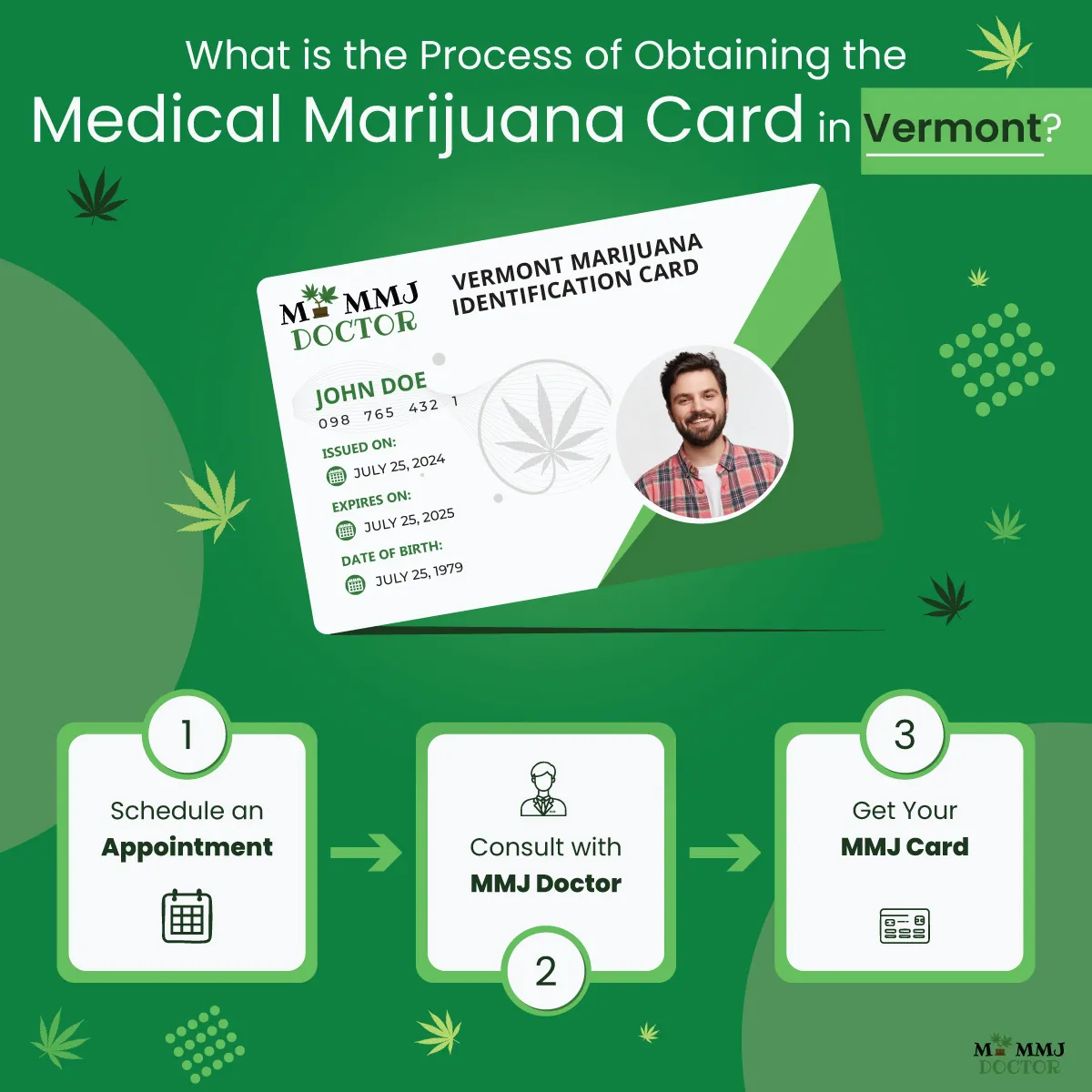
What is the Process for Getting an MMJ Card in Vermont?
- Step – 1: Consult a Licensed Healthcare Professional
The first step is to consult with a licensed healthcare professional who can evaluate your medical condition to determine if you qualify for medical marijuana treatment. If you are having difficulty finding a provider, My MMJ Doctor offers a team of licensed healthcare professionals who can assist you. You can either visit a professional in person or connect with one online. - Step – 2: Sign-Up and Schedule Your Appointment
For the online option, visit our website, My MMJ Doctor, and complete the registration form by providing your personal details and medical information. Once registered, you can schedule an online appointment with one of our qualified professionals. For offline services, you can consult a healthcare provider directly in person.
- Step – 3: Evaluation by a Health Professional
During your online consultation, a licensed healthcare professional will evaluate your condition via a secure audio-video call. For offline consultations, the evaluation will occur in person. If your medical condition qualifies for medical marijuana treatment under Vermont law, the healthcare professional will provide you with the necessary certification. - Step – 4: Submit Your Application to the Vermont Marijuana Registry (VMR)
After receiving your certification, complete your application for an MMJ card through the Vermont Marijuana Registry (VMR). The application can be submitted online through the official VMR portal or mailed offline. - Step – 5: Pay the Application Fee and Receive Your Card
To finalize the process, pay the required state application fee (typically $50). If approved, your medical marijuana card will be delivered via mail within 30 days. For online applications, the approval process is often quicker, ensuring a smoother experience.
How to Become a Caregiver in Vermont?
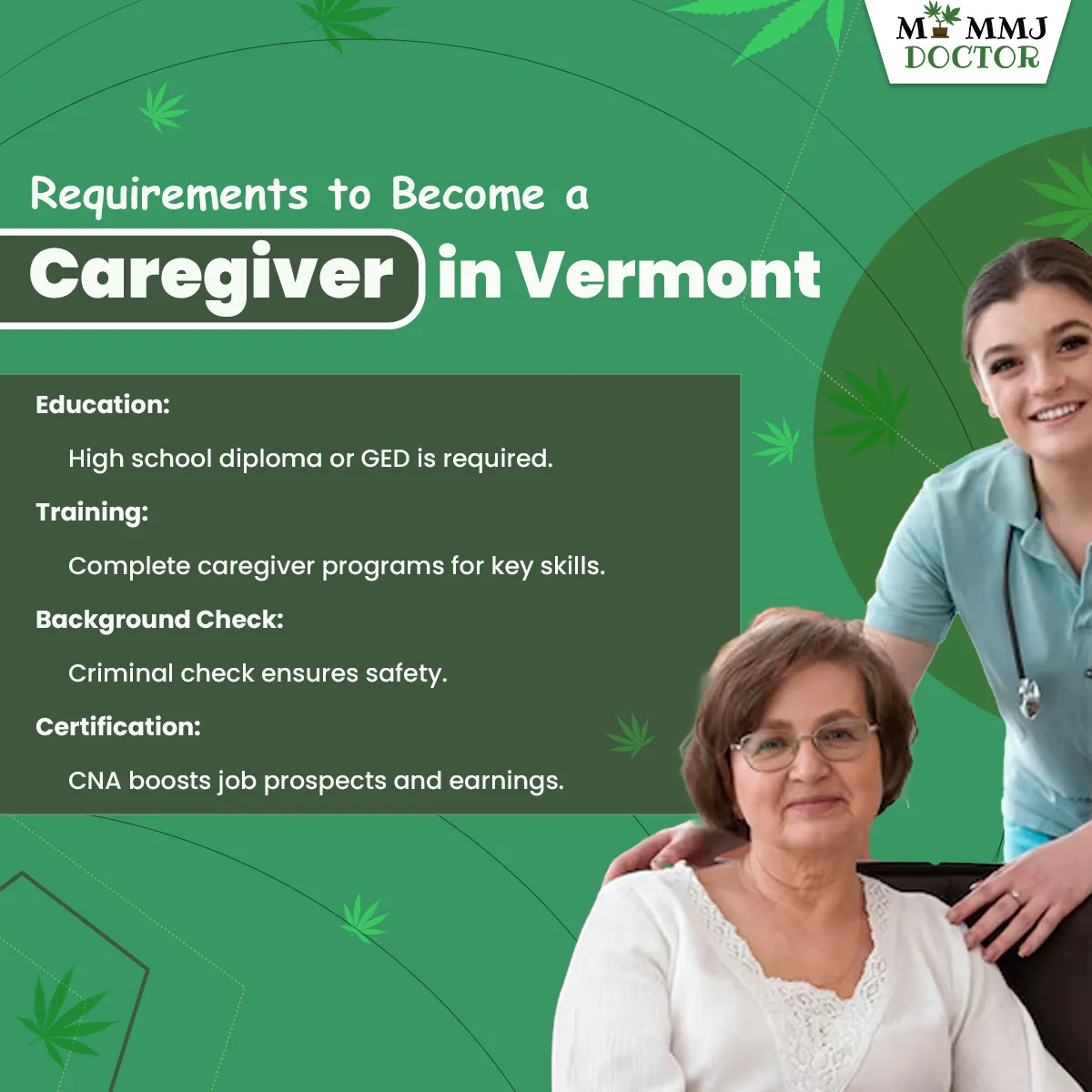
Requirements to Become a Caregiver in Vermont:
To become a caregiver in Vermont, there are specific educational and legal requirements to meet:
- Education: A high school diploma or GED is typically the minimum requirement, though some employers may prefer candidates with post-secondary education or relevant certifications.
- Training: Completing a caregiver training program is crucial for acquiring the necessary skills and knowledge. These programs typically cover personal care, first aid, medication management, and ethical considerations.
- Background Check: All caregivers in Vermont must undergo a criminal background check to ensure the safety of vulnerable individuals.
- Certification: While not required, obtaining a Certified Nursing Assistant (CNA) certification can improve job prospects and increase earning potential.
Conclusion
FAQs
- Is it Legal to Buy Marijuana Seeds in Vermont?
Yes, it is legal for adults aged 21 and older to purchase marijuana seeds in Vermont. The state allows residents to cultivate cannabis plants for personal use, making seed purchases a necessary and lawful activity. Seed sales are typically regulated, so purchasing from licensed dispensaries or reputable sources ensures compliance with state laws. Buyers must ensure they adhere to Vermont’s cultivation limits and guidelines to avoid any legal issues.
- Is Marijuana Legal in Vermont for Recreational Use?
Yes, recreational marijuana is legal in Vermont. The state legalized it in 2018, allowing adults aged 21 and older to:- Possess: Up to 1 ounce of cannabis.
- Cultivate: Up to 6 plants at home, with a maximum of 2 mature (flowering) plants and 4 immature (non-flowering) plants.
The cultivation of cannabis must occur on private property and out of public view. Any marijuana harvested from the plants must be stored securely to prevent unauthorized access, particularly by minors. Additionally, Vermont does not allow the sale of recreational marijuana without a license, so any transactions beyond personal cultivation must involve licensed retailers.
- Where Can You Legally Smoke Marijuana in Vermont?
- Permitted Areas:
- Private property with the owner’s consent.
- Designated consumption areas (rare in Vermont).
- Prohibited Areas:
- Public spaces like streets, parks, and schools.
- Vehicles, both as a driver or passenger.
- Federal property, including national parks.
- Certain private spaces, such as rentals or workplaces, as per policies.
- Permitted Areas:
Marijuana use is also banned where tobacco smoking is restricted. Vermont’s laws aim to balance legalization with public safety.
- Can you hunt if you have a medical marijuana card?
No, you cannot legally hunt if you have a medical marijuana card. Federal law prohibits anyone who uses marijuana, even for medical purposes, from possessing or using firearms. Since hunting typically involves the use of firearms, this creates a legal issue for medical marijuana cardholders. While some states may have different regulations, the federal restriction still applies, making it illegal to hunt with a firearm if you’re a medical marijuana user. Always check local state laws, but keep in mind that federal law takes precedence when it comes to gun ownership and marijuana use.
Related Articles
How to Get a Medical Marijuana Card in Maryland?
How Can You Obtain Your Medical Marijuana Card in Maryland in 2025?Are you a Maryland resident seeking a way to manage your symptoms naturally? You came to the right place. Maryland has a medical marijuana program that allows eligible...
Benefits You Are Missing Without a Michigan MMJ Card
Top Benefits of a Michigan Medical Marijuana CardIf you live in Michigan and already use cannabis, you likely know it’s easy to access. However, many people don’t realize that having a Michigan medical marijuana (MMJ) card offers additional...
What are the Michigan Medical Marijuana Laws?
What are the Michigan Medical Marijuana Laws?Medical marijuana has been legal in Michigan since 2008, helping thousands of residents manage chronic pain, anxiety, cancer symptoms, and more. But knowing what’s allowed - and what’s not - can...

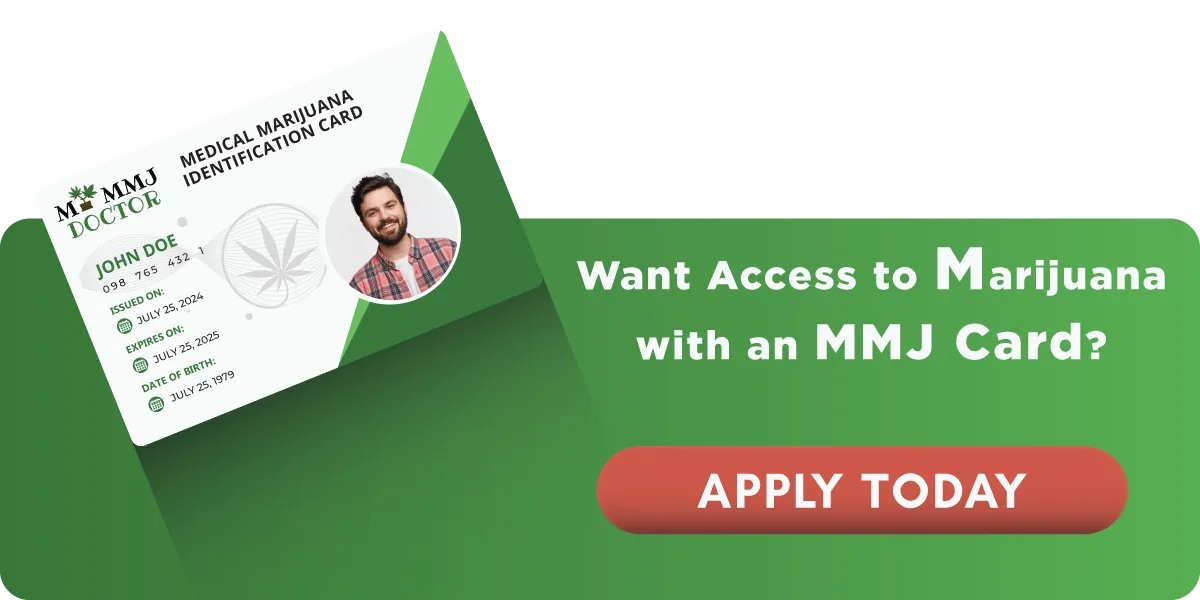

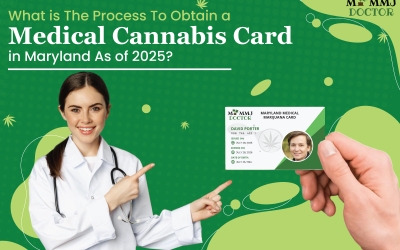
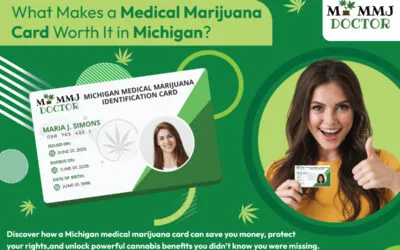
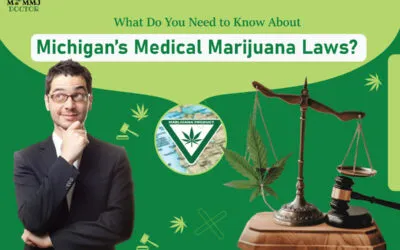
0 Comments